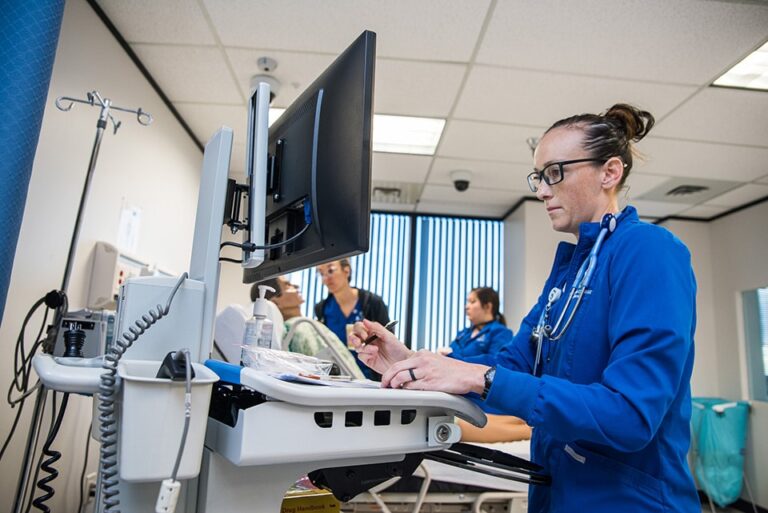There are several reasons why I chose nursing. I was drawn to nursing because it is a noble profession that combines science with human compassion and care delivery. In addition, nursing was a pragmatic career choice as the profession offers job stability, competitive pay, various specialty options, as well as opportunities for professional advancement.
Looking back on my journey into nursing, I can think of several things I wish I had known as I navigated school. This blog post will review my background and experience as a nurse, what I wish I had known before starting nursing school, and tips for navigating nursing school.
My Nursing Experience
I earned my Bachelor of Science in Nursing (BSN) degree in 2016. From there, I began my career as a nurse in women’s health. I also returned to school that same year to pursue my Master of Science in Nursing (MSN) with the goal of becoming a family nurse practitioner (FNP). I completed my master’s studies in 2019. Since then, as a certified nurse practitioner, I have worked in primary care, sleep medicine, and infusion. Finally, in October 2023, I completed a post-master’s graduate certificate in nursing education, and I am hoping to transition into a faculty position as a nurse educator as the next step in my career.
I have had a rewarding nursing career, and it has been a great privilege to be part of the nursing profession. I owe my career to my solid educational foundation, and below I describe tips for selecting a nursing program and for achieving success during school.
What I Wish I Knew Before Starting Nursing School
When I began researching nursing programs, I was overwhelmed, to say the least. There are so many options for prospective students, and selecting a program is a big decision since nursing school is a huge investment monetarily, personally, and in terms of time. Having gone through the process of selecting a nursing program, I can strongly recommend a few criteria that you should consider to get the most out of your nursing school experience.
- Look for an accredited school. This requirement should be non-negotiable. Accreditation is a marker of program quality that is granted through an extensive, rigorous program evaluation process by agencies recognized by the U.S. Department of Education. The Commission on Collegiate Nursing Education (CCNE) is an important organization that engages with schools of nursing and awards accreditation only to those programs that meet their rigorous quality standards. As a student, if you see that a program is accredited, you know you will receive an excellent education.
- Pursue your BSN from the start. Secondly, I would strongly encourage students to pursue a BSN as part of their initial nursing education. The BSN is becoming the preferred degree for entry-level nurses by many employers. I say this because BSN-prepared nurses (as opposed to associate’s-prepared nurses) consistently provide higher quality patient care, making them more attractive to prospective healthcare employers. In addition, a BSN will also position you well to return to school for an advanced degree, such as an MSN.
- Visit the nursing program’s campus. If possible, I’d recommend you visit the nursing program’s campus and take every opportunity to speak with current faculty, staff, and students. These visits can provide insight into things like student support and the overall culture of the program. It is also helpful to see the skills laboratory and simulation technology the school has available.
- NCLEX-prep. The NCLEX-RN is the culminating licensing exam that new graduates must successfully pass to become a Registered Nurse (RN). Be sure to ask the program about the support available for students regarding NCLEX-RN preparation and pass rates for its graduates over the past several years. Ideally, a program should expose students to NCLEX-style examination questions as early in the program as possible.
What I Wish I Knew During School: Tips for Future Nurses
There are also a few tips I can offer prospective nursing students who are going through nursing school:
- Figure out how you learn best. During school, you will need to learn quickly and you will be expected to synthesize large volumes of knowledge from your foundational classes into your higher-level nursing courses and clinical learning. You will have guidance from your faculty, but you will thank yourself later if you can figure out early how you learn best. Whether through readings, videos, lectures, or other means, you want to embrace the best learning methods for you.
- Know you are being prepared for entry-level practice. The expectation of a new graduate nurse is to be a safe healthcare provider, not an expert in all things nursing. During school, your focus should be on developing your critical thinking skills and the ability to make sound clinical judgments for patient safety. I cannot emphasize this point enough as this is what you will also be tested on when you finally sit for the NCLEX examination.
- Join a study group. Nursing school will feel much less overwhelming if you can find classmates to study with and turn to for support. These classmates will see you through the most challenging and rewarding phases of education. Only other nursing students can truly relate to the experience of nursing school, so finding a friend through the process is invaluable.
Why a BSN From Arizona College of Nursing Makes a Difference
Starting a nursing career is a big decision, and your choice of a BSN program is critically important. I can confidently recommend it to prospective nursing students for several reasons:

Furthermore, NCLEX-RN exam preparation is emphasized early on and continually throughout the program. Arizona College of Nursing’s 3-year BSN program features all the key criteria I would require if I were to choose a nursing program again.
Author Bio
Tana Bao is an experienced advanced practice registered nurse. She earned her BSN from The University of Massachusetts Amherst in 2016 and her MSN from Thomas Jefferson University in 2019. She is board certified to practice as a family nurse practitioner with both The American Academy of Nurse Practitioners (NP-C) and The American Nurses Credentialing Center (FNP-BC). Clinically, she has worked in various medical settings including women’s health, sleep medicine, infusion, and primary care. She now also writes professionally as a health content writer and has also completed a post master’s graduate certificate in nursing education.
Start Your Future in Nursing Today

Why Choose Arizona College of Nursing?
- Earn a BSN degree in 3 years or less with eligible transfer credits
- Campus locations throughout the US
- Night classes for general education courses
- Hybrid Online/In-Person format for general education classes
- Nursing education is all we do
- CCNE-Accredited Program*
- NCLEX-RN success coaches and exam preparation class
- Financial aid available to those who qualify
Discover Your Path to a Career in Nursing
Information in this post is accurate as of .
*The Bachelor of Science in Nursing (BSN) degree program at Arizona College of Nursing is accredited by the Commission on Collegiate Nursing Education (https://www.aacnnursing.org/). All Arizona College of Nursing and Arizona College campuses are institutionally accredited by the Accrediting Bureau of Health Education Schools (https://www.abhes.org/), a U.S. Department of Education-recognized national accrediting agency.

